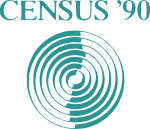1990 US census
| Twenty-first Census of the United States |
|
|---|---|

U.S. Census Bureau Seal
|
|

Census Logo
|
|
| General information | |
| Country | United States |
| Date taken | April 1, 1990 |
| Total population | 248,709,873 |
| Percent change |
|
| Most populous state |
California 29,760,021 |
| Least populous state |
Wyoming 453,588 |
The Twenty-first United States Census, conducted by the Census Bureau, determined the resident population of the United States to be 248,709,873, an increase of 9.8 percent over the 226,545,805 persons enumerated during the 1980 Census.
Approximately 16 percent of households received a "long form" of the 1990 census, which contained over 100 questions. Full documentation on the 1990 census, including census forms and a procedural history, is available from the Integrated Public Use Microdata Series.
It was the first census to designate "Native Hawaiian and Other Pacific Islander" as a racial group separate from Asians.
To increase black participation in the 1990 United States Census, the bureau recruited Bill Cosby, Magic Johnson, Alfre Woodard, and Miss America Debbye Turner as spokespeople. The Integrated Public Use Microdata Series. Aggregate data for small areas, together with electronic boundary files, can be downloaded from the National Historical Geographic Information System. Personally identifiable information will be available in 2062.
The results of the 1990 census determined the number of seats that each state receives in the United States House of Representatives starting with the 1992 elections. Consequently, this affected the number of votes each state has in the Electoral College for the 1992 presidential election.
...
Wikipedia
